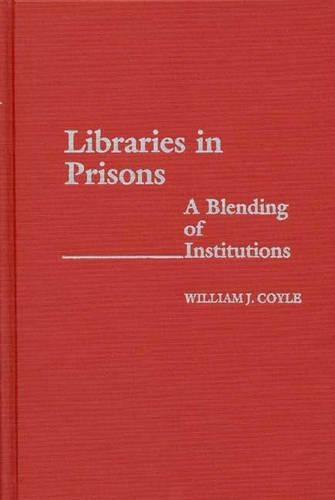
Libraries in Prisons: A Blending of Institutions
(Hardback)
Publishing Details
Libraries in Prisons: A Blending of Institutions
By (Author) William J. Coyle
Bloomsbury Publishing PLC
Praeger Publishers Inc
23rd March 1987
United States
Classifications
Tertiary Education
Non Fiction
027.665
Physical Properties
Hardback
153
Width 140mm, Height 216mm
369g
Description
This is the first book-length study of prison libraries to provide a comprehensive overview of their history and to analyze their development in terms of the goals of correctional agencies and the values and traditions of librarianship. The author's introduction points out that in recent years new considerations have made it more difficult to clearly determine the value and purpose of prison libraries with respect to both the inmates who use them and the institutions of which they are a part. A heightened sense of professional consciousness in the library profession, expanded awareness of the uses of libraries, and changes in the laws and politics of criminal justice have all contributed to new ways of thinking about prison libraries, and have made a seemingly once simple matter complex.
Reviews
Coyle presents a change-based model for correctional librarianship; a model that is linked to society's inherent interest in behavioral change of the criminal. Thus, librarians focus service not to please the inmate but to participate in this socialization process. For most librarians educated in library schools with the public library as the model of service, this concept is confusing and possibly disturbing. Coyle suggests the establishment of core courses to train correctional librarians who will be effective in their profession. Libraries in Prisons is a valuable book, one that is long overdue and that should be read by library educators, correctional administrators, and federal judges. But it seems that those librarians presently 'incarcerated' would most benefit from reading this work. If there is any criticism at all, it is that the author relies solely on American sources. There is a growing body of literature, especially from Europe, that could contribute to any discussion of the subject. But this is a minor point; Coyle has done well, and Libraries in Prisons is valuable reading.-The Library Quarterly
Not much exists about prison libraries. Such libraries, much like the inmates inhabiting prisons, are out of sight, hence out of mind. Coyle summarizes the establishment of library services in American prisons quite nicely, drawing interesting parallels to changing notions of treatment and rehabilitation. Prison libraries have been largely modeled on the public library, attempting to provide similar services, materials, and programs based on the demand of the use. In Prison Libraries, Coyle suggests such modeling has little relevance for the prison. He suggests a change-based' model that reflects correctional goals rather than the need for the inmate in establishing prison library purposes. While one might take serious issue with Coyle's premise, his work does posit a serious concern for identifying purposes of the prison library.-Phil Koons, Institution Services, State Library of Ohio
"Not much exists about prison libraries. Such libraries, much like the inmates inhabiting prisons, are out of sight, hence out of mind. Coyle summarizes the establishment of library services in American prisons quite nicely, drawing interesting parallels to changing notions of treatment and rehabilitation. Prison libraries have been largely modeled on the public library, attempting to provide similar services, materials, and programs based on the demand of the use. In Prison Libraries, Coyle suggests such modeling has little relevance for the prison. He suggests a change-based' model that reflects correctional goals rather than the need for the inmate in establishing prison library purposes. While one might take serious issue with Coyle's premise, his work does posit a serious concern for identifying purposes of the prison library."-Phil Koons, Institution Services, State Library of Ohio
"Coyle presents a change-based model for correctional librarianship; a model that is linked to society's inherent interest in behavioral change of the criminal. Thus, librarians focus service not to please the inmate but to participate in this socialization process. For most librarians educated in library schools with the public library as the model of service, this concept is confusing and possibly disturbing. Coyle suggests the establishment of core courses to train correctional librarians who will be effective in their profession. Libraries in Prisons is a valuable book, one that is long overdue and that should be read by library educators, correctional administrators, and federal judges. But it seems that those librarians presently 'incarcerated' would most benefit from reading this work. If there is any criticism at all, it is that the author relies solely on American sources. There is a growing body of literature, especially from Europe, that could contribute to any discussion of the subject. But this is a minor point; Coyle has done well, and Libraries in Prisons is valuable reading."-The Library Quarterly
Author Bio
WILLIAM J. COYLE is Correctional Library Consultant at the Colorado State Library.
